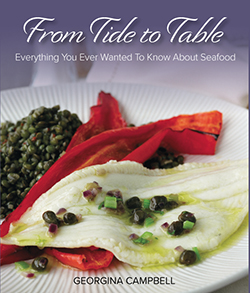Insider View on Demanding Guests
 This month, Lucy Madden describes some of the increasingly unreasonable behaviour of demanding guests - observing that ‘the accumulation of wealth and power seems to go hand in hand with rudeness and often, inexplicably, meanness’.
This month, Lucy Madden describes some of the increasingly unreasonable behaviour of demanding guests - observing that ‘the accumulation of wealth and power seems to go hand in hand with rudeness and often, inexplicably, meanness’.
Can you imagine being described as ‘a nightmare’? Even this keyhole Katie has not heard herself thus described - yet - but this is a word increasingly bandied about to describe guests among those whose life work is providing hospitality. As travel opportunities broaden, so too does the public’s appetite to be pleasured.
My childhood holidays spent in seaside boarding houses where it was necessary to be out of the premises all day and where alcohol was forbidden although ironically the ‘lounge’ was thick with stale pipe smoke, are a long way from the Valhalla in which many of today’s holiday makers expect to find themselves.
At a small Welsh hotel in the 1950s the highlight of the evening was a rallying call from the landlady announcing the distribution of plates of junket. We looked forward to it all day. Imagine the ribaldry that would accompany such an announcement today. And what is junket, I hear you ask?
Over time, our dizzying expectations of holidays, bolstered by social media and the increasing opportunities afforded to us demand more and more of the hospitality provider. Does anyone these days spare a thought for these poor souls? Perhaps the worst offender is ‘the bride’s mother’ but more of this later.
My own observation of the world’s travellers is that the richer they come, the worse they behave. Scott Fitzgerald never wrote a wiser sentence than ‘the rich are different’. Sadly, the accumulation of wealth and power seems to go hand in hand with rudeness and often, inexplicably, meanness. Lavish tips are more likely to come from the hands of the less well off.
Our own island is unlikely to become a playground for the very rich, except in racing circles, and for this we should be glad. Our daughter once worked for a rich and powerful man and was horrified by the enormity of his ego even when his demands put the lives of those around him in danger.
She was, however, part of his retinue when he was told – not ‘asked’ – to leave a hotel in France after a particular incident of bad behaviour. It takes some courage and not a little foolhardiness to tell a guest to leave, but there are occasions when one is sorely tempted.
Recently a party from a distant shore arrived here and demanded that we make up bedrooms on our ground floor for them as they did not wish to climb two flights of stairs to the existing rooms.
This might have been possible in their native country where labour is cheap and available on tap, but in this 350 year old house, such removals are not on. Many travellers seem to expect complete standardisation of services and establishment with no regard for the experience that the providers set out to offer, or as in this case any comprehension of the limitations imposed by the character of the building they have chosen. This type of encounter is something new; the spoilt of the world are on the move. A plateful of junket will no longer cut the mustard.
The relationship between hosts and guests is a delicate one with tact necessary from both parties. It behoves the host to give as good a service as is possible and permissible, but the visitor must not demand more than can reasonably be given although increasingly this is happening.
Here I think of that species ‘the bride’s mother’ and it has not escaped attention that many wedding venues now limit the amount of telephone calls and emails that are permitted in the contract in the run-up to the wedding.
In the way that film makers will take over public places with their paraphernalia and demand immediate obedience from bystanders, even reluctant ones, so the bridal event becomes a force that brooks no obstacles and takes no prisoners. (Here, however, I must admit that my own dislike of attending weddings, the ultimate in social torment especially for the over 50s, may be influencing my judgement).
The type of guest that this family has encountered over the years has been an endorsement of the qualities of human nature. Whether this is something to do with the fact that the type of person who is attracted to a heritage property in rural Ireland is more likely to be a curious, courteous and appreciative human being than one who prefers the world’s fleshpots, is just my observation. That my family do not run a complex in a beachside resort in a hot country, I shall be forever grateful.
I recently spent some hours in the departure lounge at Bristol airport and saw the bulbous, flesh-baring fatties gathered for take-off to sunny climes attired in outfits that will do little to enhance the reputation of British designers, and I feared for the world.
That societies where modesty and reticence is revered should have to play host to people so disrespectful of their cultures must have unforeseen consequences. Just as we don’t want visitors who we will describe as ‘nightmares’, so too might Black Sea beaches strewn with the marauding and near naked obese have its own consequences.
Travellers are ambassadors, after all.
 Together with her husband Johnny & family, Lucy Madden runs their magnificent 18th century mansion, Hilton Park, Clones, Co Monaghan as a country house which is open to private guests, groups, small weddings and conferences. The restored formal gardens are also open by arrangement. Lucy is a keen organic gardener and also a member of the Irish Food Writers Guild.
Together with her husband Johnny & family, Lucy Madden runs their magnificent 18th century mansion, Hilton Park, Clones, Co Monaghan as a country house which is open to private guests, groups, small weddings and conferences. The restored formal gardens are also open by arrangement. Lucy is a keen organic gardener and also a member of the Irish Food Writers Guild.






There are currently no comments
Leave a comment
Not a member? Register for your free membership now!
Or leave a comment by logging in with: